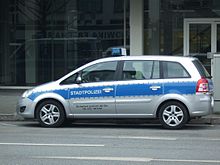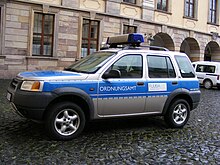
Baden-Württemberg, commonly shortened to BW or BaWü, is a German state in Southwest Germany, east of the Rhine, which forms the southern part of Germany's western border with France. With more than 11.07 million inhabitants as of 2019 across a total area of nearly 35,752 km2 (13,804 sq mi), it is the third-largest German state by both area and population. As a federated state, Baden-Württemberg is a partly-sovereign parliamentary republic. The largest city in Baden-Württemberg is the state capital of Stuttgart, followed by Mannheim and Karlsruhe. Other major cities are Freiburg im Breisgau, Heidelberg, Heilbronn, Pforzheim, Reutlingen, Tübingen, and Ulm.

Mannheim, officially the University City of Mannheim, is the second-largest city in the German state of Baden-Württemberg, after the state capital of Stuttgart, and Germany's 21st-largest city, with a 2021 population of 311,831 inhabitants. The city is the cultural and economic centre of the Rhine-Neckar Metropolitan Region, Germany's seventh-largest metropolitan region with nearly 2.4 million inhabitants and over 900,000 employees.
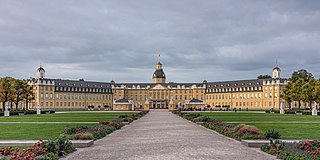
Karlsruhe is the third-largest city of the German state of Baden-Württemberg, after its capital Stuttgart and Mannheim, and the 22nd-largest city in the nation, with 308,436 inhabitants. It is also a former capital of Baden, a historic region named after Hohenbaden Castle in the city of Baden-Baden. Located on the right bank of the Rhine near the French border, between the Mannheim-Ludwigshafen conurbation to the north and Strasbourg to the south, Karlsruhe is Germany's legal center, being home to the Federal Constitutional Court, the Federal Court of Justice and the Public Prosecutor General.
A Police Community Support Officer, or as written in legislation Community Support Officer, is a uniformed member of police staff in England and Wales, a role created by Section 38(2) of the Police Reform Act 2002, which was given Royal Assent by Queen Elizabeth II on 24 July 2002. They are not warranted, but hold a variety of police powers and the power of a constable in various instances by the forty-three territorial police forces in England and Wales and the British Transport Police.
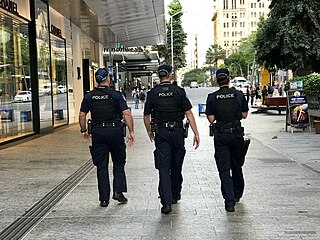
State police, provincial police or regional police are a type of sub-national territorial police force found in nations organized as federations, typically in North America, South Asia, and Oceania. These forces typically have jurisdiction over the relevant sub-national jurisdiction, and may cooperate in law enforcement activities with municipal or national police where either exist.

Landespolizei is a term used to refer to the state police of any of the states of Germany.

Code enforcement, sometimes encompassing law enforcement, is the act of enforcing a set of rules, principles, or laws and ensuring observance of a system of norms or customs. An authority usually enforces a civil code, a set of rules, or a body of laws and compel those subject to their authority to behave in a certain way.

Ettenheim is a city in the Ortenaukreis, Baden-Württemberg, Germany.

Law enforcement in Germany is constitutionally vested solely with the states, which is one of the main features of the German political system.
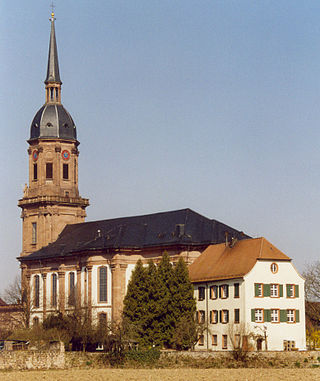
Friesenheim is a municipality in the Ortenau district of Baden-Württemberg, Germany.

The Republic of Baden was a German state that existed during the time of the Weimar Republic, formed after the abolition of the Grand Duchy of Baden in 1918. It is now part of the modern German state of Baden-Württemberg.

Baden-Württemberg Police is a state law-enforcement agency in Germany. It numbers approximately 35,000 police officers and civilian employees.

The Grand Duchy of Baden was an independent state in what is now southwestern Germany until the creation of the German Empire in 1871. It had its own state-owned railway company, the Grand Duchy of Baden State Railways, which was founded in 1840. At the time when it was integrated into the Deutsche Reichsbahn in 1920, its network had an overall length of about 2,000 kilometres (1,200 mi).

The municipal security guards existing in about 40 Austrian municipalities are police forces besides the Austrian Federal Police. They may also be called city security guard, municipal police (Gemeindepolizei), local police (Ortspolizei) or city police (Stadtpolizei). The larger of these forces form municipal guard corps with competences equal to the Federal Police. Some municipalities including most statutory cities are not allowed to maintain a guard corps.
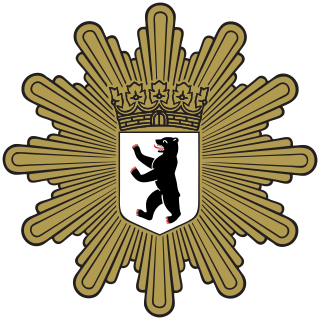
The Berlin Police is the Landespolizei force for the city-state of Berlin, Germany. Law enforcement in Germany is divided between federal and state (Land) agencies.

Gremium Motorcycle Club is a German outlaw motorcycle club. Gremium claims to be the largest German motorcycle club since the patchover of the also formerly Mannheim-based German chapters of the Bones MC to the Hells Angels MC in 1999, with 73 full chapters in Germany, 71 chapters in other European countries, several associate chapters in Germany, and a prospect chapter opened by German expatriates in Pattaya, Thailand in 2007. The club was established in 1972 in Mannheim.
The Minister-president is the head of state and government in thirteen of Germany's sixteen states.

Peter Kurz is a German politician of the Social Democratic Party of Germany (SPD). He was the Lord mayor of Mannheim, the second-largest city in the German state of Baden-Württemberg from 4 August 2007 to 3 August 2023.


